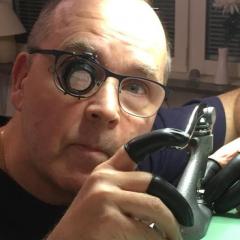-
Recently Browsing
- No registered users viewing this page.
-
Topics
-
Posts
-
I've remained silent on this thread, and at the risk of upsetting everyone, the thing that worries me the most the the apparent absence of Mark. The moderators do a great job and the members also pitch in, and the site seems to run itself, but it is a concern for the future of this forum when the owner is absent for all intents and purposes. Like many of the comments above I would hate to log in one day and things be closed down as I rely on this site for ideas and knowledge and also cheer me up. maybe the Moderators could reach out to him, assuming he does not read this thread, and express our concerns and let us know the plans going forward?
-
By Neverenoughwatches · Posted
That was the exact reason for me starting this thread watchie. Still we haven't worked out how the regulars are going to hook up if it goes tits up. I honestly think something should be arranged to stay in contact, we all help each other so much. -
By Neverenoughwatches · Posted
Yeah ive watched that a few times before, i couldnt find my old school dividers to scribe it up 😅 Yep thats the guy i bought a roll from . Thanks Nicklesilver that answers that perfectly and more or less what i thought an experiment over time would prove . The jumper arm is quite thick along its length, i left it that way intentionally, i thought the original was probably very thin, i didnt see that it was already missing. Setting isn't particularly stiff as such just positive, i still need to take it out and polish where it mates with the stem release. -
Yes, "Sold out" is difficult to understand. There doesn't seem to be a lot going on. It's been nine months since any new video was published on the Watch Repair Channel. The Level 4 course on watchfix.com has been in progress for what feels like forever (several years!?). Maybe Mark's enterprises aren't doing well or perhaps already so profitable there's nothing much to motivate him for more material. Or, perhaps these days he's more into crochet. The real reason is probably something entirely different but it would be nice/interesting to know. I don't mean to sound gloomy or pessimistic, but I wouldn't be surprised to be met by an HTTP 404. Every day feels like a gift. Speaking of watchfix.com I've been postponing the "Level 5: Servicing Chronograph Watches" course for a very, very long time. Anyway, I just enrolled on it so it's going to be very interesting to see the videos. I must say, IMO there's nothing really that can compete with Mark's courses when it comes to presentation and video quality. It's simply world-class and makes me associate with some really expensive BBC productions.
-
By nickelsilver · Posted
Steel has some funny properties, or at least counterintuitive. The modulus of elasticity is effectively (not exactly, but close enough) the same for steel that is annealed and hardened. What changes is the point of plastic deformation* . If the movement of your spring doesn't pass that, it should work fine. It looks a little thick, I would thin it a bit maybe from the main body out about halfway, maybe 10-20% thinner (not in thickness, along its form). But if it works it works! *So- if you have two bars of the same steel, one annealed, one at 600 Vickers (general hardness watch arbors might be), clamp them to a table so the same length is hanging out, and put a weight on the ends, they will bend the same amount. But if you continue to add weight, then remove it, at a point the annealed bar won't return to its original straightness. That's the point of plastic deformation. But up to that point, as springs, they are the same. However- their wear characteristics will be very very different. And getting the hardened bar past its point of plastic deformation takes a lot more effort.
-







Recommended Posts